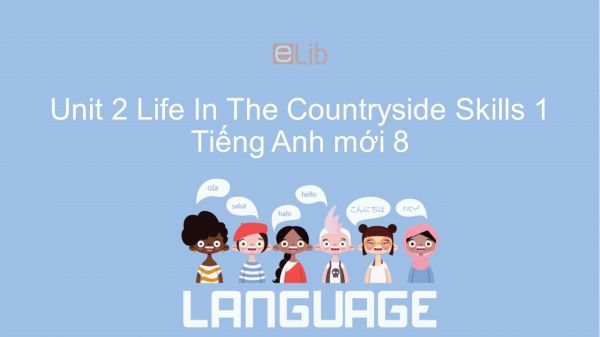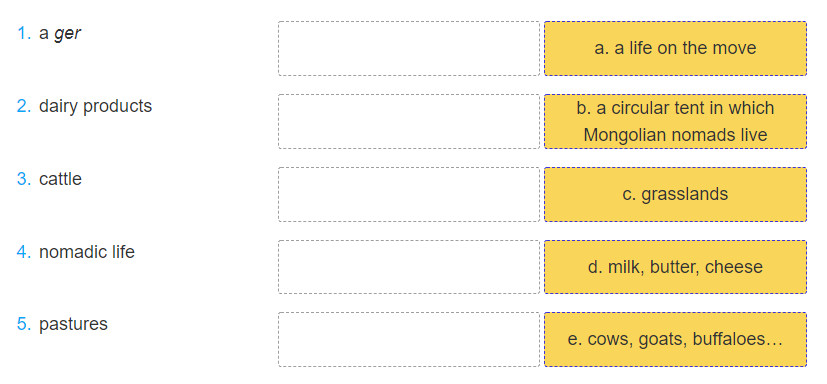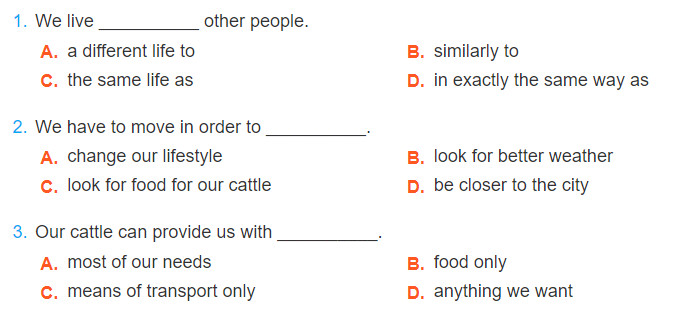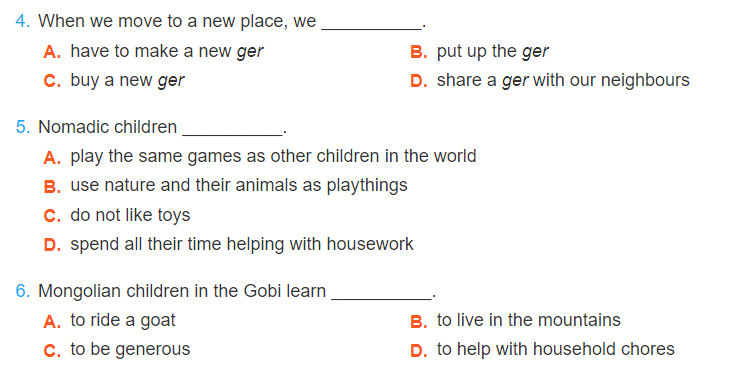Unit 2 lớp 8: Life In The Countryside - Skills 1
Bài học Unit 2 lớp 8 mới phần Skills 1 giúp các em luyện tập hai kĩ năng chính là Reading và Speaking. Mời các em cùng tham khảo!
Mục lục nội dung

1. Reading
1.1. Task 1 Unit 2 lớp 8
Quickly read the passage and choose the most suitable heading A, B, or C for each paragraph. (Đọc nhanh đoạn văn và chọn tựa đề thích hợp A, B hoặc C cho mỗi đoạn văn.)
NOMADIC LIFE ON THE GOBI HIGHLANDS
1. We don’t live a normal life like many other people. We live a nomadic life. This means we move two or three times a year to look for new pastures - grasslands - for our cattle. The cattle provide most of our needs: dairy products, meat, and clothing.
2. We live in a ger, our traditional circular tent. It keeps us cool in summer and warm in winter, even when the temperature drops to -50°C. It can be put up then taken down and transported.
3. For most of the year, we are surrounded by vast pastures, rivers and mountains. We see few people from the outside world. When we are small, we play on our land and with the animals. The horse is our best friend. Any nomadic child can ride a horse. We learn from an early age to help in the family, from household chores to heavier work like herding the cattle. We also learn to be brave.
Guide to answer
1. B. The importance of cattle to nomads.
2. C. The nomads’ home.
3. A. Nomadic children’s lives .
Tạm dịch:
CUỘC SỐNG DU MỤC TRÊN CAO NGUYÊN GOBI
1. Sự quan trọng của gia súc đối với người du mục.
Chúng tôi không sống một cuộc sống bình thường như nhiều người khác. Chúng tôi sống một cuộc sống du mục. Điều này có nghĩa là chúng tôi di chuyển 2 hay 3 lần một năm để tìm đồng cỏ mới - cho gia súc chúng tôi. Gia súc mang đến cho chúng tôi hầu hết các nhu cầu: sản phẩm sữa, thịt và quần áo.
2. Nhà của người du mục
Chúng tôi sống trong một cái lều của người du mục, một loại lều hình trụ truyền thống. Nó giữ chúng tôi mát mẻ vào mùa hè và ấm áp vào mùa đông, thậm chí khi nhiệt độ giảm còn -50 độ c. Nó có thể được dựng sau đó dỡ xuống và vận chuyển đi.
3. Cuộc sống của những đứa trẻ du mục
Hầu hết các năm, chúng tôi bị bao quanh bởi đồng cỏ bao la, những dòng sông và núi. Chúng tôi gặp vài người từ thế giới bên ngoài. Khi chúng tôi nhỏ, chúng tôi chơi trên cánh đồng với những con vật. Ngựa là bạn thân nhất của chúng tôi. Bất kỳ đứa trẻ du mục nào cũng có thể cưỡi ngựa. Chúng tôi học từ nhỏ để giúp đỡ trong gia đình, từ việc nhà cho đến công việc nặng hơn như chăn gia súc. Chúng tôi cũng học phải trở nên dũng cảm.
1.2. Task 2 Unit 2 lớp 8
Match the descriptions with the words/phrases from the passage. (Nối những miêu tả với những từ/ cụm từ từ đoạn văn.)

Guide to answer
|
1 - b |
2 - d |
3 - e |
4 - a |
5 - c |
1. a ger - a circular tent in which Mongolian nomads live
(một căn lều hình trụ mà người du mục Mông Cổ sống trong đó)
2. dairy products - milk, butter, cheese
(sản phẩm từ sữa - sữa, bơ, pho mai)
3. cattle - cows, goats, buffaloes…
(cưỡi - bò, dê, trâu)
4. nomadic life - a life on the move
(cuộc sống du mục - cuộc sống di chuyển)
5. pastures – grasslands
(đồng cỏ - cánh đồng cỏ)
1.3. Task 3 Unit 2 lớp 8
Read the passage again and choose the best answer A, B, C, or D. (Đọc đoạn văn lần nữa và chọn câu trả lời tốt nhất A, B, C hoặc D)


Guide to answer
|
1. A |
2. C |
3. A |
4. B |
5. B |
6. D |
1. We live a different life to other people.
(Chúng tôi sống một cuộc sống khác với những người khác.)
2. We have to move in order to look for food for our cattle.
(Chúng tôi phải di chuyển để tìm thức ăn cho gia súc.)
3. Our cattle can provide us with most of our needs.
(Gia súc chúng tôi có thể cung cấp cho chúng tôi hầu hết các nhu cầu.)
4. When we move to a new place, we put up the ger.
(Khi chúng tôi chuyển đến một nơi mới, chúng tôi dựng một cái lều dành cho người du mục.)
5. Nomadic children use nature and their animals as playthings.
(Trẻ em du mục sử dụng thiên nhiền và động vật của chúng như là đồ chơi.)
6. Mongolian children in the Gobi learn to help with household chores.
(Trẻ em Mông Cổ ở Gobi học cách giúp đỡ làm công việc nhà.)
2. Speaking
2.1. Task 4 Unit 2 lớp 8
Work in pairs. Interview your partner to find out what he/ she likes/ doesn't like about the life of the nomads. (Làm theo cặp. Phỏng vấn bạn học để tìm ra cái mà cậu ấy/ cô ấy thích hoặc không thích về cuộc sống du mục.)
Example:
A : What do you like about their nomadic life?
B: Well, the children can learn to ride a horse.
A: And what don’t you like about it?
B: They can't live permanently in one place.
Tạm dịch:
A: Bạn thích gì về cuộc sống du mục của họ?
B: À, trẻ em có thể học cưỡi ngựa.
A: Và bạn không thích gì về nó?
B: Họ không thể sống vĩnh viễn ở một nơi.
Guide to answer
A: What do you like about the life of the nomads?
B: You know, they grow vegetables and raise animals by themselves. They must have no worries about food safety and sanitation.
A: And what don’t you like about it?
B: They can’t get a stable job and their own accommodation, because they constantly change locations, switching from one place to another.
Tạm dịch
A: Bạn thích điều gì ở cuộc sống của những người du mục?
B: Bạn biết đấy, họ tự trồng rau và nuôi động vật. Họ hẳn không phải lo lắng về vấn đề vệ sinh an toàn thực phẩm.
C: Và bạn không thích điều gì?
D. Họ không thể có được một công việc ổn định và chỗ ở của riêng họ, bởi vì họ liên tục thay đổi địa điểm, chuyển từ nơi này sang nơi khác.
2.2. Task 5 Unit 2 lớp 8
a. Work in pairs. Discuss and find: (Làm theo cặp. Thảo luận và tìm ra:)
- two things you like about life in the countryside (hai điều bạn thích về cuộc sống ở miền quê)
- two things you don't like about life in the countryside (hai điều bạn không thích về cuộc sống ở miền quê)
Guide to answer
- two things you like about life in the countryside
+ People can live in the fresh atmosphere. (Người ta sống trong không khí trong lành)
+ They can catch fish for food. (Họ có thể bắt cá để làm thức ăn)
- two things you don't like about life in the countryside
+ There are no shopping centers or supermarket. (Không có trung tâm mua sắm hay siêu thị)
+ There are no advanced facilities (Không có những trang thiết bị hiện đại)
b. Report your findings to the class (Thông báo những phát hiện của bạn trước lớp.)
Example:
Both of us love picking fruits in the summer. It can be hard work but verv satisfying.
Tạm dịch:
Cả hai chúng tôi đều thích hái trái cây vào mùa hè. Nó là công việc khó khăn nhưng rất thỏa mãn.
Guide to answer
Both of us love the air and the traffic in the countryside. The air is fresher and the traffic isn't so heavy.
(Cả hai chúng tôi đều yêu thích không khí và giao thông ở nông thôn. Không khí trong lành hơn và giao thông không quá nghiêm trọng.)
3. Practice Task 1
Read the passage below and decide whether the statements are TRUE or FALSE?
I’m Bing. My grandmother told me that our village used to be very poor many years ago. The villagers had to work hard in the fields all day but they could not earn enough for their living. Their lives were very simple. Many people had to live in houses made of straw and mud. Nowadays my village has changed a lot. People live in big brick houses. In the evening, they can listen to the news on the radio or watch TV for entertainment. All people in my village try their best to make their living better. They raise and resurface the roads so that the roads will not be muddy and flooded after it rains.
Question 1: Bing’s village used to be poor in the past.
A. True B. False
Question 2: Their lives were very simple
A. True B. False
Question 3: Many people had to live in houses made of straw and mud.
A. True B. False
Question 4: Now people still live in mud houses
A. True B. False
Question 5: The road has been renovated to improve living standard.
A. True B. False
4. Practice Task 2
Choose the letter A, B, C or D to complete the passage below
They widen the roads so cars and lorries can get to the village easily. They build a medical centre so people’s health can be looked (6) __________ at any time. They build a new school so their (7) __________ have better learning conditions. They build a bridge (8) __________ the river so villagers have a shorter way to town. They also build a football ground so their children can (9) __________ sports. In addition, they grown cash crops so people can export the crops and have more money.
I would like to become an agricultural engineer in the future so I can apply new technology to our farming and do more for the village (10) __________ our parents did.
Question 6: A. on B. for C. into D. after
Question 7: A. adults B. children C. parents D. husbands
Question 8: A. on B. by C. over D. to
Question 9: A. do B. play C. get D. have
Question 10: A. as B. like C. so D. similar
5. Conclusion
Qua bài học này các em sẽ củng cố thêm kĩ năng đọc hiểu và kĩ năng nói của mình về cách đưa ra ý kiến về cuộc sống du mục và ghi nhớ các từ vựng sau:
- normal /ˈnɔːml/ bình thường
- pasture /ˈpɑːstʃə(r)/ thảo nguyên, đồng cỏ
- vast /vɑːst/ rộng lớn
- ride /raɪd/ cưỡi
- herd /hɜːd/ chăn, nuôi
- brave /breɪv/ dũng cảm
Tham khảo thêm
- doc Unit 2 lớp 8: Life In The Countryside - Getting Started
- doc Unit 2 lớp 8: Life In The Countryside - A Closer Look 1
- doc Unit 2 lớp 8: Life In The Countryside - A Closer Look 2
- doc Unit 2 lớp 8: Life In The Countryside - Communication
- doc Unit 2 lớp 8: Life In The Countryside - Skills 2
- doc Unit 2 lớp 8: Life In The Countryside - Looking Back
- doc Unit 2 lớp 8: Life In The Countryside - Project
